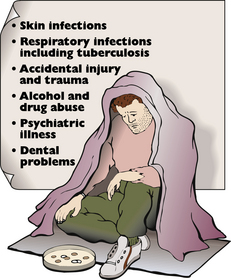Chapter 27 Housing, homelessness and health
Housing affects health directly and indirectly. Lack of adequate housing causes both mental and physical ill health. It can make existing illness and health problems worse, and delay recovery from illness (Fig. 1). Lack of adequate housing has detrimental social and economic consequences, which reduce people’s opportunities to protect and promote their own health. Energy-inefficient housing contributes to fuel poverty and is detrimental to the environment and this has consequences for the health of the whole population.
Housing and health
In Victorian Britain, concerns about housing conditions causing ill health led to programmes of slum clearance. This commitment to improving public health by changing harmful social conditions contributed to the decline in infectious diseases and increases in life expectancy (see pp. 42–43).
Homelessness and health
The term ‘homeless’ is used to describe people who are ‘roofless’ and living on the streets and those living in temporary accommodation. People who are homeless are exposed to extreme environmental hazards such as damp, cold and noise as well as overcrowding, risk of violence, risk of accidental injury, poor hygiene and poor access to health services. Figure 1 shows the main illnesses associated with homelessness.
The health impact
How does lack of adequate housing affect health? The housing environment can affect health both directly and indirectly (Box 1).







